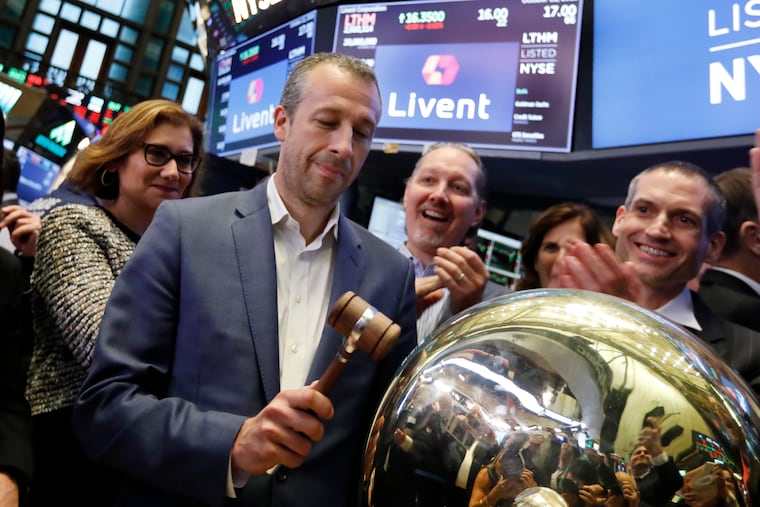As lithium supply outpaces demand for electric cars, a local company now faces a big stock drop
The Philly-based company earned $16.9 million in the first quarter of 2019, down from $32 million a year ago. But the electric car market that the company serves is growing. And if its stock "gets any lower, I’ll be buying," one expert said.

When Philadelphia-based Livent went public in October 2018, investors thought the lithium miner and processor would do extremely well because the metal is a key ingredient in the batteries of electric vehicles and smart phones, both strong sectors.
It hasn’t worked out that way yet, and Livent’s recent performance shows how even promising businesses can run afoul of changing markets.
Between 2015 and 2018, the price of lithium tripled, to meet the projected demand for electric cars. But then the number of new lithium mines surged, stoking the supply of the soft, silvery-white metal, just as the demand for electric vehicles failed to grow as fast as expected. The result was a 30% drop in the price of lithium, according to Bloomberg.
Livent, which is based in the Cira Centre South building at 2929 Walnut St., has felt the impact, as its income has been cut nearly in half over the last year. The 800-person company earned $16.9 million in the first quarter of 2019 compared with the $32 million it made a year ago, representing a 47% drop.
Its stock took a similar swoon. When the company went public in 2018, its shares sold for $16.97. Now, they’re $6.47 per share.
A spokesperson for Livent could not comment because of a Securities and Exchange Commission-mandated quiet period preceding its second-quarter earnings to be released Aug. 7.
This is an industrywide trend. Albemarle Corp., the Charlotte, N.C.-based industry leader in lithium, saw its share prices rise 137% between the beginning of 2016 and the end of 2017, selling for $140.62. Now, the shares are selling for $73.94.
Livent mines lithium from the Salar del Hombre Muerto (Salt Pan of the Dean Man) desert in Argentina, and processes it at plants in China and the U.S., among other countries. Part of the revenue decline can be attributed to poor weather in Argentina, resulting in 1,000 tons of lost lithium carbonate production and driving up the company’s production costs, said Paul Graves, Livent’s president and chief executive, in the company’s first-quarter conference call.
Graves said the industry’s key driver continues to be electric vehicles. “Global sales of passenger electric vehicles increased 58% as compared to the first quarter of 2018, for a total of 500,000 vehicles sold during the quarter. In China, sales of electric vehicles more than doubled versus Q1 2018 to 274,000 vehicles,” he said.
“Today, we see a path towards a significantly higher level of new model launches with an increase in launches now slated from late 2020 onwards,” he said.
The future models of electric vehicles will need larger, higher-powered batteries that require nickel, a chemistry that is “expected to become the backbone of the next generation of electric vehicles,” Graves said.
Joe Lowry, president of Global Lithium LLC, a lithium advisory company, said that Livent’s initial IPO of $16.97 was too high. “They have a good asset in Argentina,” said Lowry, former global sales and business development director of FMC, the company that Livent separated from in 2017. “If it gets any lower, I’ll be buying." Lowry also has a podcast called Global Lithium, where he details the industry and interviews business leaders.
“The demand for lithium will grow three to four times by 2025,” he said. “2019 is kind of a changeling year because most of the electric vehicle models aren’t being made yet. They’re two to three years away.”
Livent’s projected full-year revenue is between $435 million and $475 million, said Graves, which is consistent with the $443 million it made in 2018. However, the company’s expected earnings before interest, taxes, depreciation, and amortization (EBITDA) is between $125 million and $145 million, significantly lower than its EBITDA of $171 million in 2018. Graves credits this drop to the lowered value of lithium and the higher operating costs associated with the lost production.